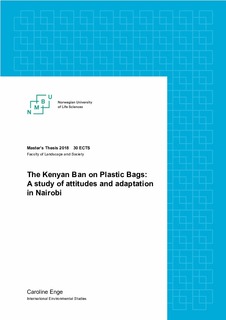| dc.description.abstract | The attention toward plastic pollution has increased in recent years, especially due to concern over marine pollution and microplastics. Although plastic bags constitute a small share of the total plastic waste, they have become the target of a number of local and national policies that aim to reduce the consumption of these bags. There are a large number of issues related to plastic bag pollution, especially in developing countries where insufficient waste management and lack of infrastructure can exacerbate the problems. However, implementing a policy and establishing new institutions can affect social groups and individuals differently. The effectiveness of such policies depends not only on the nature of the problem, but also the social context.
Plastic bag pollution is a classical environmental problem and a solution requires coordination of human behaviour. From a new institutionalist perspective, I attempt to describe and understand Kenya’s recent ban on plastic bags in terms of how it is affecting behaviour and attitudes among people in Nairobi. Through interviews and a small survey among inhabitants in different parts of the city, I found that the implementation and enforcement of the ban was strict, but there were a number of exemptions. While the views on different aspects of the ban varied, the support for the ban was strong, and the support had increased after the ban was implemented. I also found that awareness of the problems caused by plastic bags seemed high among the respondents. In terms of adaptation, the lack of alternatives to the bags created challenges, especially for people in informal settlements. While the behavioural changes varied between groups and individuals, the ban had affected most of the participants.
Uncovering any actual effects of awareness and attitudes on behaviour under a strict ban is challenging. While the strict enforcement of the ban ensured compliance, long term changes in the motivation and attitudes of the actors are necessary for the ban to last. While a ban may alleviate some of the issues related to plastic bag waste, it cannot solve the underlying problems, including an insufficient system for waste management in a growing city. | nb_NO |

